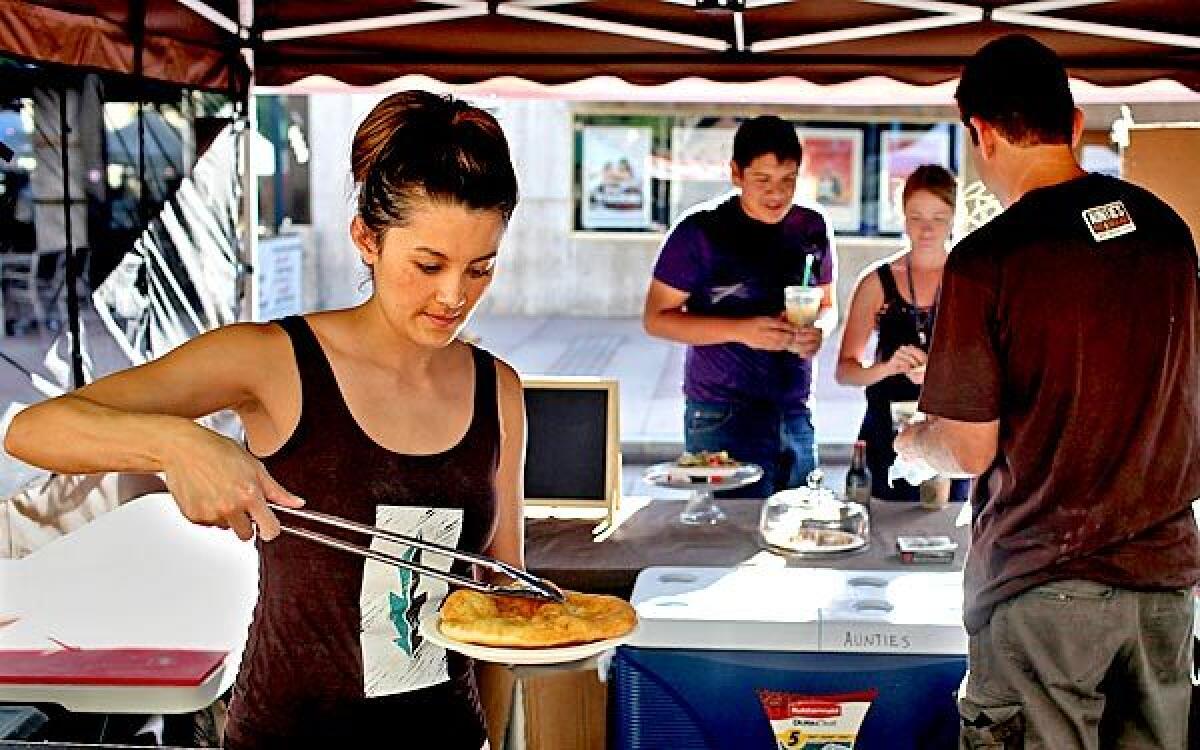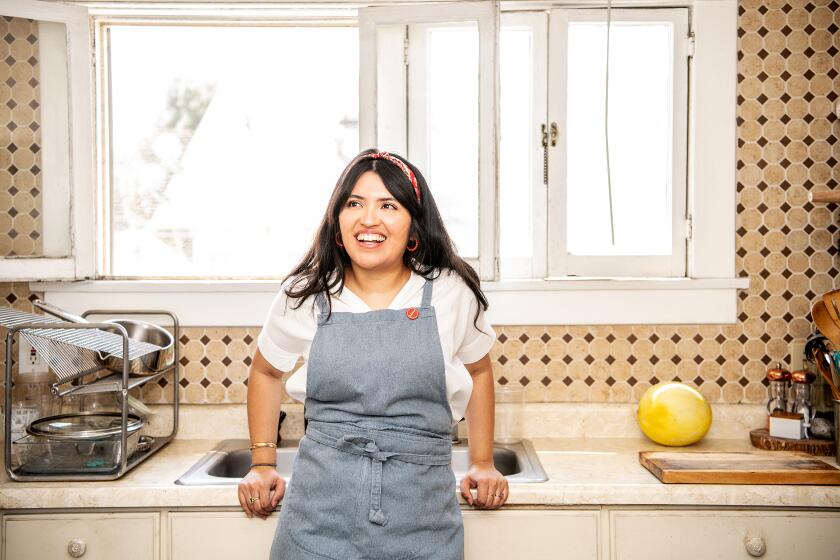Kickstarter’s growing grass-roots food scene

- Share via
Kate Koyama moved to Los Angeles from Hardin, Mont., to work in film production, but then a year ago a new dream started to take shape: selling Native American fry bread tacos. She already had her own family recipe, passed down from her Aunt Bernice Cook, for the puffy disks of golden fried dough topped with meaty chili, cheese, lettuce, tomatoes and corn (Koyama’s own addition). “I barely remember a time when I didn’t know how to make them,” Koyama says. Thus was born Auntie’s Fry Bread Tacos.
The only problem was she didn’t have the money to set up a stand at farmers markets. So Koyama and her boyfriend, Eric Evans, turned to Kickstarter, the “crowd-funding” website that launched last year aimed at artists who want to raise money for their creative projects. They raised $5,450 that went toward equipment, marketing and permits, and last month made Aunt Bernice proud by opening Auntie’s Fry Bread Tacos at the Wednesday farmers market in Westwood.
Sasha Kanno also used Kickstarter to fund Farm Lot 59 in Long Beach, an empty patch of city-owned no-man’s land butting up against Signal Hill that she plans to transform into a 1-acre biodynamic urban farm. Callie Beckman has raised more than $2,000 to start her L.A.-based Chill Baby gluten-free ice cream sandwich business.
Kickstarter may be a virtual hotbed of nascent filmmakers and prolific artists, but it’s also a window into what’s happening at the grass-roots level of local food scenes, whether it’s an all-natural snow cone stand in Kansas City, Mo., or writers collecting recipes in Gaza or a community olive oil press in Berkeley. No food-driven fantasy seems too small or too out there: a mission to film and promote the making of camel cheese (yes, camel cheese) from Mongolia to Afghanistan; a website devoted to “why honey is not vegan”; a bicycle that churns butter and makes toast.
And though design and comics projects are the most popular (according to Kickstarter’s popularity algorithm) and tech-ideas-gone-viral such as Diaspora (the open-source alternative to Facebook from four students whose goal was to raise $10,000 and who ended up with more than $200,000) are the ones making headlines, food is a growing category.
The way it works is the website connects people looking for money for their projects with people willing to donate. Tiered rewards are offered based on the amount of the pledge. So, maybe $10 gets you a glass of bubbly at the opening of a Brooklyn restaurant that is trying to raise $10,000 for a bar counter, stools, tiles and kitchen appliances. Or a $40 pledge toward the making of a documentary about the Southern delicacy pimento cheese gets your name in the film credits.
Projects must be fully funded in a specified amount of time, or they get nothing at all.
Food projects have a success rate of 56%, compared with 47% for all projects, says Yancey Strickler, a founder of New York-based Kickstarter. And it’s the third-most popular category on the site. There are 19 categories, including art, writing/publishing, film/video, music, dance, fashion, technology and theater.
“Food projects are really imaginative,” Strickler says. “Food tells a story and often a story within a story, about not just a person who cares about something and what happens along the way, but also here’s where my special avocado recipe comes from and why I make it. That’s what people respond to.”
It worked for Koyama and Evans of Auntie’s Fry Bread Tacos. “I couldn’t find any fry bread tacos in L.A. and wanted to make them for people who missed them and for people who’d never had them before,” says Koyama, who grew up near the Crow reservation and whose family still makes fry bread tacos for Hardin’s annual Little Big Horn Days (the highlight of which is a reenactment of Custer’s Last Stand).
Kickstarter approves the projects, each of which is usually accompanied by an explanatory video, before they are posted on the site. “We really favor projects that people can execute themselves. It’s DIY. You don’t have to hire a bunch of people to make stuff for you,” says Strickler, who notes that “it’s a very foodie office here.”
The average food project has a funding goal of about $5,000, he says. Though some also are thinking big. Erik Myers of Mystery Brewing Co., a contract brewery based in Chapel Hill, N.C., raised more than $44,000 this summer and is now working on his inaugural beers.
Still, many would-be entrepreneurs are encouraged by being able to start small. “I wanted to start slowly,” says Chill Baby’s Beckman, who had heard of Kickstarter from a couple of friends who had used the site to fund a movie and to sail around the world, respectively. “I figured it would be a great way to help me get the ball rolling and see if this is an idea that’s valid.”
Chill Baby’s campaign was 95% funded within five days, Beckman says, and already has surpassed her goal. “I think gluten-free people tend to feel neglected and are excited about something new. Also, one of the best things about Kickstarter is that it gives people who already want to support you a way of supporting you.”
Farm Lot 59’s Kanno, who began a Kickstarter campaign after looking into grants that didn’t fit her needs, was able to raise $10,905.
Kanno, along with youth workers from the Pacific Gateway Workforce Investment Network run by the city of Long Beach to help provide jobs, already is clearing the land that she found using Google Earth, located amid natural wetlands. One of the next steps is the irrigation system. Eventually she’ll plant heirloom varieties of vegetables, plus salad mixes and tropical fruit.
“I did some hustling on the back end,” Kanno says, “on Facebook, letting people know at the farmers market every weekend, I made diorama panels and took them with me everywhere on the bus. It forces you to do some guerrilla marketing.”
Those who have received often give back. “I’ve backed 10 projects now,” says Myers of Mystery Brewing. “Things that I think are really creative and clearly have passion behind them or things where I can get something cool out of it. Like a bakery in New York City, because for $5, she’d send me a batch of cookies in the mail. It’s hard to go wrong with a batch of cookies in the mail.”
betty.hallock@latimes.com
More to Read
Eat your way across L.A.
Get our weekly Tasting Notes newsletter for reviews, news and more.
You may occasionally receive promotional content from the Los Angeles Times.











